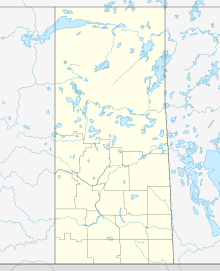T.rex Discovery Centre
 | |
 | |
 Location within Saskatchewan | |
| Established | 2001 |
|---|---|
| Location | 1 T-Rex Drive Eastend, Saskatchewan, Canada |
| Type | Natural history |
| Visitors | 10,000 |
| Director | Peter Menzies |
| Owner | Government of Saskatchewan |
| Website | royalsaskmuseum |
The T.rex Discovery Centre is a natural history museum located in Eastend, Saskatchewan, Canada, and housed in a building designed by Stantec. The T.rex Discovery Centre was opened to the public in 2001, and was intended house a number of fossils, including the remains of a Tyrannosaurus nicknamed "Scotty" which was found nearby in 1991.[1][2] Management of the T.rex Discovery Centre was assumed by the Royal Saskatchewan Museum in 2013.
History[]
The idea for a world-class facility to house the fossil record of southwest Saskatchewan began in 1988. Through a series of public meetings, the Town of Eastend, Saskatchewan identified a need for a palaeontological centre to showcase the rich fossil record of the Frenchman River Valley and the Cypress Hills. The T.rex Discovery Centre opened in 2001 in the Frenchman River Valley, about 25 km southeast of Eastend. On February 14, 2013 the Royal Saskatchewan Museum assumed operations of the T.rex Discovery Centre.[3][4]
Galleries[]
Cretaceous Gallery[]
This gallery explores the geologic sediments deposited to create the Bearpaw Formation and the Frenchman Formation and the fossils within. This includes invertebrates from the Bearpaw Formation such as ammonite and baculite, fish, shark, turtles and marine reptiles and fossils from the Frenchman Formation including Tyrannosaurus rex, Triceratops and Hadrosaurus.[5]
Cenozoic Gallery[]

Some species of mammals, birds and fish survived the K-Pg extinction event. The Ravenscrag Formation is where these fossils were deposited and the gallery examines these creatures from Saskatchewan's prehistoric landscape. On display are reptiles such Borealosuchus and Champsosaurus as well as a life-size cast of the mammal Brontothere.[6]
Fossil Research Station[]
Museum palaeontologists work year-round in the station to conduct research on fossils collected over the summer field season.[7]
Scotty the T. rex[]

Originally discovered by Royal Saskatchewan Museum research team in Saskatchewan's Frenchman River Valley on August 16, 1991, the fossilized remains of specimen [RSM P2523.8], nicknamed Scotty, were painstakingly removed – almost completely by hand – over two decades from the rock in which they were embedded.[8] When the preparation was complete in 2011, a 65% complete Tyrannosaurus rex skeleton was revealed.[9]
"Scotty" the T. rex was found on August 16, 1991 by local high school principal Robert Gebhardt.[10] Gebhardt had joined palaeontologists Tim Tokaryk and John Storer from the Royal Saskatchewan Museum (RSM) on a prospecting expedition alongside the Frenchman River Valley.[11] Gebhardt stumbled across a tail vertebra of the T. rex on a cattle trail he was walking along. They later found a piece of the jaw with teeth still attached sticking out of the side of a hill. Today, about 65% of Scotty's bones have been recovered.
A cast of Scotty was first to go on display at the T.rex Discovery Centre on March 15, 2013,[12] followed by a second in an exhibit developed by the Australian Museum in November 2013.[13]
On March 21, 2019 Scotty was described to be the largest and oldest T. rex in the world, with an estimated weight of 8870 kg, length of 13 m and age of over 30 years. The previous owner of the 'longest lived T Rex' titled was Sue, who lived to be 28.[14][15]
On May 17, 2019 a cast of Scotty was unveiled at the Royal Saskatchewan Museum.[16]
References[]
- ^ "T-rex bones called giant find of significance". The Desert News. June 30, 1994. Retrieved 17 August 2014.
- ^ "Scotty back at home in Eastend". Prairie Post. 15 March 2013. Archived from the original on 20 May 2017. Retrieved 17 August 2014.
- ^ "ROYAL SASKATCHEWAN MUSEUM TO OPERATE T.REX DISCOVERY CENTRE | News and Media". Government of Saskatchewan. Retrieved 2019-07-30.
- ^ "T.rex Discovery Centre « T.rex Discovery Centre". royalsaskmuseum.ca. Retrieved 2019-07-30.
- ^ "The Cretaceous « T.rex Discovery Centre". royalsaskmuseum.ca. Retrieved 2019-08-01.
- ^ "Saskatchewan After the Dinosaurs « T.rex Discovery Centre". royalsaskmuseum.ca. Retrieved 2019-08-01.
- ^ "FOSSIL RESEARCH STATION FOR EASTEND | News and Media". Government of Saskatchewan. Retrieved 2019-08-01.
- ^ "TYRANNOSAURUS REX FOSSIL COMPLETELY REMOVED FROM QUARRY | News and Media". Government of Saskatchewan. Retrieved 2019-07-30.
- ^ "World's biggest T. rex discovered". Science & Innovation. 2019-03-26. Retrieved 2019-07-30.
- ^ McLennan, David. "Eastend". Encyclopedia of Saskatchewan. Canadian Plains Research Centre, University of Regina. Archived from the original on 12 August 2017. Retrieved 17 August 2014.
- ^ Lewry, Marilyn. "Frenchman River". Encyclopedia of Saskatchewan. Canadian Plains Research Centre, University of Regina. Archived from the original on 12 March 2017. Retrieved 17 August 2014.
- ^ "ONE OF THE LARGEST T.REX SKELETONS NOW ON DISPLAY IN EASTEND | News and Media". Government of Saskatchewan. Retrieved 2019-07-30.
- ^ "REPLICA OF SCOTTY THE T.REX SET TO WOW MUSEUM-GOERS IN SYDNEY, AUSTRALIA | News and Media". Government of Saskatchewan. Retrieved 2019-07-30.
- ^ Persons, W. Scott; Currie, Philip J.; Erickson, Gregory M. (2019). "An Older and Exceptionally Large Adult Specimen of Tyrannosaurus rex". The Anatomical Record. 303 (4): 656–672. doi:10.1002/ar.24118. ISSN 1932-8494. PMID 30897281.
- ^ "Scotty: the dinosaur skeleton which is a contender for the largest T. rex ever". Guinness World Records. 2019-04-15. Retrieved 2019-07-30.
- ^ "'Biggest, baddest thing that ever lived': Scotty the T-rex roars into Regina museum". CBC.
External links[]
Coordinates: 49°31′21″N 108°49′38″W / 49.5224°N 108.8272°W
- Museums in Saskatchewan
- Dinosaur museums
- Natural history museums in Canada
